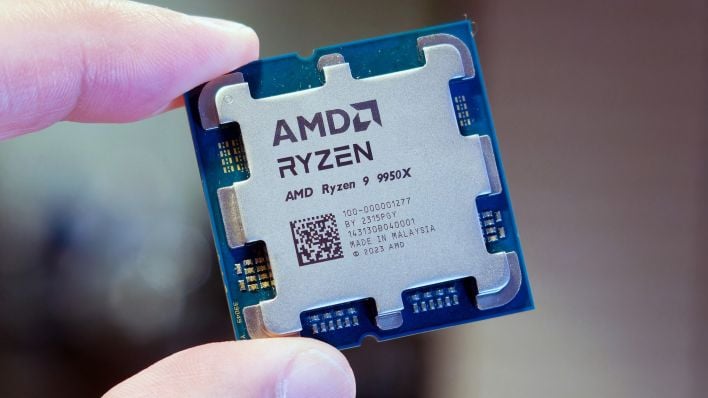
The Ryzen 9 9950X isn’t actually available yet, but benchmarks have been cropping up all over the web. We reported before on some leaked results in Geekbench, but today we have a pile of multi-threaded tests from a fellow on the Anandtech forums who got ahold of an ES (engineering sample) Ryzen 9 9950X and has been putting it through its paces.
The poster, “igor_kavinski,” is enthusiastic about his results, and it’s easy to see why. In his testing, the Ryzen 9 9950X is generally beating all comers. His comparisons in the thread are all against other AMD CPUs (including the Ryzen 9 5950X, Ryzen 9 7950X, and even an EPYC 7702P), but the really interesting part of these posts is that he is performing the benchmarks at a wide variety of power levels.

This chart compiles results from a number of different sources to give an idea of how the Ryzen 9 9950X ES processor is performing. As we can see, the Ryzen 9 9950X is clearly tuned for high-power multi-core performance, as it actually performs worse than the Ryzen 9 7950X at very low power limits. We can see that more clearly in this next chart, which compares the 9950X ES against user Det0x’s tightly-tuned 7950X build:

The scores in this chart are per-watt, based on Cinebench R23 and actual measured CPU power—though the numbers on the left are power limits, not power usage. As you can see, the tweaked Ryzen 9 7950X delivers superior performance per watt until the ~120-130W level, where the ES chip overtakes and then pulls away from the last-gen part. Even at this stage, though, it’s important to remember that this is not final silicon and may not have proper voltage/frequency curves configured for these power levels.
But what about the real performance? Well, here’s a chart of Cinebench R23 multi-threaded benchmark scores, incorporating igor’s data and our own results, as well as one test from AMD…

Very impressive stuff. Igor_Kavinski’s Ryzen 9 9950X ES chip only requires a 160W PPT—lower than the retail default—to defeat Intel’s current desktop flagship. It also demolishes a default-configuration Ryzen 9 7950X with 42% less power used. The really interesting part is that where the Ryzen 9 7950X loses steam after about 250 watts, the Zen 5-based Ryzen ES chip continues to scale with unlimited power.
Indeed, that top result in the chart is from AMD’s recent benchmark run where the CPU was overclocked with the benefit of liquid nitrogen cooling. However, even without manual overclocking, the chip will do some 48,011 points in the benchmark just by unlocking the power limit. Folks in the thread compared this against a 64-core EPYC 7702P processor and found that it is nearly the same score despite the Zen 5 chip having one-fourth the number of cores and threads.
Zen 5, in both Ryzen AI 300 mobile form and Ryzen 9000 desktop chips, looks extremely promising so far. We plan to have a review of these parts up as soon as we’re allowed to, so stay tuned for our own testing — it won’t be much longer.